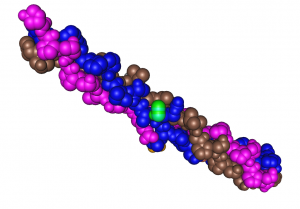 A recent review article in the Journal of Drugs in Dermatology reviews the data to support collagen supplementation in the treatment of various skin conditions. This is a very welcome addition to the literature, since so few “neutraceuticals” are rigorously studied.
A recent review article in the Journal of Drugs in Dermatology reviews the data to support collagen supplementation in the treatment of various skin conditions. This is a very welcome addition to the literature, since so few “neutraceuticals” are rigorously studied.
What is collagen?
Collagen is the main component of extracellular matrix, contributing 75% of the dry-weight of skin. It is natural, therefore, to consider its use for various skin conditions.
Collagen protein in skin is a triple helix of polypeptides with every third amino acid being glycine. This results in a recurring triplet pattern of X-Y-glycine. X and Y are frequently proline and 4-hydroxyproline, respectively.
If collagen is denatured by heat it becomes the commonly found gelatin. If gelatin is further broken down enzymatically it produces collagen hydrolysates, which are peptides of random lengths. If further processed, collagen can be made into bioactive dipeptide and tripeptides.
Is collagen ingestion helpful for skin conditions?
The authors identified 11 randomized controlled studies with a total of 805 patients in which subjects consumed either collagen hydrolysate, collagen tripeptides, or collagen dipeptides with various endpoints, including wound healing and skin aging, depending on the study. Collagen sources used in the studies include Pro-Stat, Verisol, Peptan, Gold Collagen, and other tripeptide and dipeptide formulations. The overall results of these studies were promising. Findings in various studies include:
- Improved pressure ulcer healing.
- Reduction in eye wrinkles
- Improved skin elasticity
- Increased skin moisture content
- Faster post-laser erythema recovery
Collagen supplementation appears to be safe, with no notable adverse events reported. It is not conclusively demonstrated that collagen supplementation is helpful. And if collagen is helpful, none of the studies compared collagen hydrolysate or bioactive peptides with plain old gelatin!
Overall, though, it seems that for now collagen supplementation falls into the can’t hurt, might help category.
J Drugs Dermatol. 2019;18(1):9-16.

